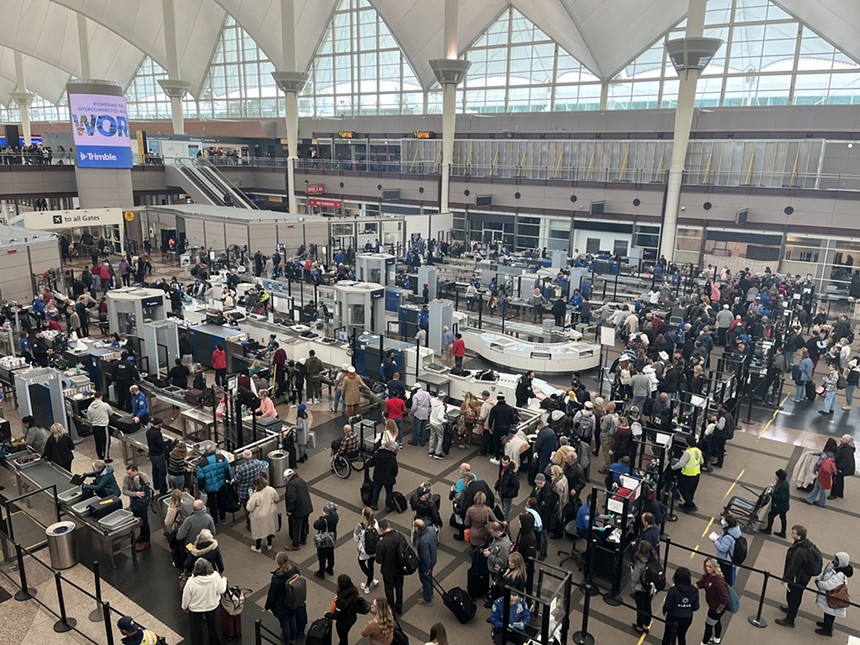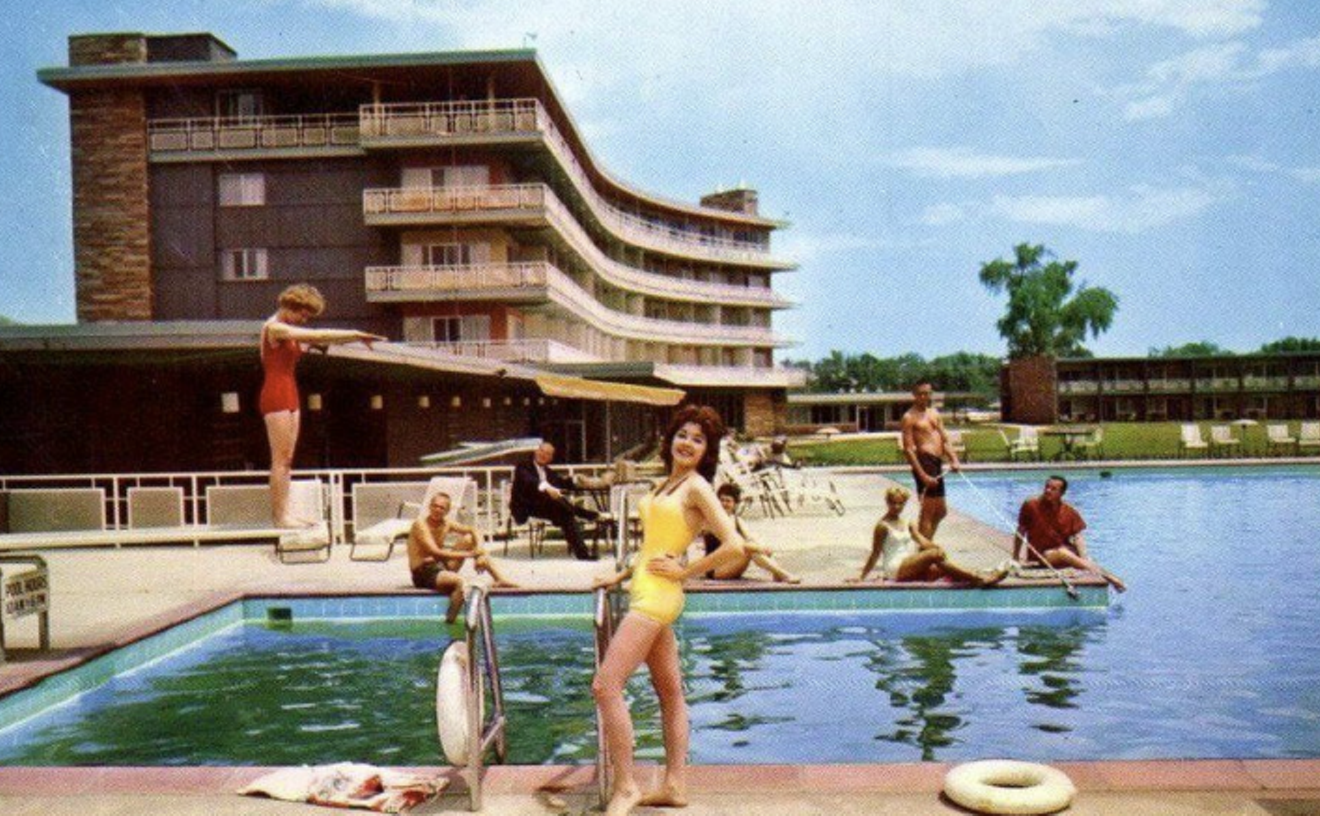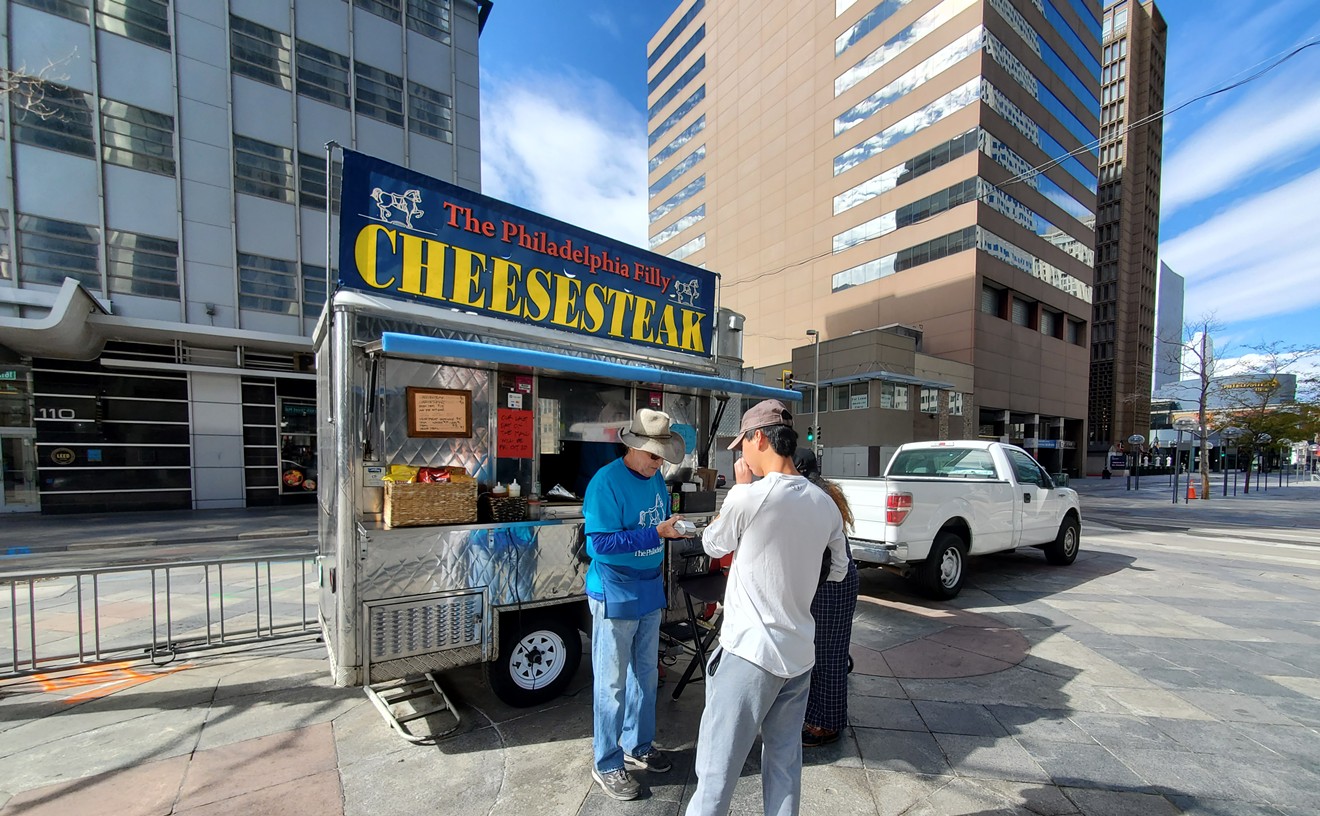It was a sad comedown for Denver, a city that a dozen years ago was considered the coolest city in the country. Parsing numbers from the U.S. Census Bureau’s American Community Survey, the Brookings Institution determined that from 2008 to 2010, even as the hopes for a quick comeback from that recession faded, young adults between the ages of 25 and 34 were high on Denver — and proved it by coming here at an unprecedented rate, with a per capita surge unequaled by any other city. “To the extent that they are moving at all,” said demographer William Frey, “young adults are headed to metro areas which are known to have a certain vibe — college towns, high-tech centers and so-called ‘cool cities.’”
And in November 2011, Frey declared that Denver was the coolest of them all. But during the pandemic, Denver went cold. Very cold.
Although young adults were still moving here, they were coming not to create their own opportunities in the city during a recession — and concocting creative ways to cover then-still reasonable rent — but to hole up near the mountains while they worked remotely and largely ignored the city where they'd relocated. Because they could afford to, even though Denver's average rent has risen faster than that of almost every other city over the past decade.
Last summer, we despaired of Denver ever getting its mojo back. But now our hopes are rising. After twelve years, we finally have a new mayor taking office July 17, one who went into election day reaffirming his commitment to community and promptly established 28 transition committees to look into how this city is — and isn't — working. And Mike Johnston has also invited Denver's residents to share their thoughts online and at public forums.
We shared some of our own thoughts in the inaugural edition of "How Denver Can Get Its MoJo Back" in July 2022. Denver was in a perfect position for a comeback, we said then. For starters, it had a well-deserved reputation for inclusiveness that's only grown over the past year, as women have made a beeline for the metro area because their health-care choices are limited, even criminalized, in other states. And the Queen City of the Plains has lived up to a newer interpretation of that Victorian-era nickname by welcoming not just gays, but the entire LGBTQ+ rainbow, including transgender people shunned back in their own states.
But then there was that disappointing 303 Creative decision coming out of the U.S. Supreme Court, which got its start in Colorado. And there have been other setbacks, too.
Over the past twelve months, we've seen mushrooms become legal and other natural drugs decriminalized, inspiring an entrepreneurial rush similar to what the state saw after the passage of Amendment 64 in late 2012. Still, marijuana sales have fallen more than 20 percent from their pandemic high, and Colorado's cannabis industry is suffering. So are important tax revenues on both the state and municipal levels.
And Denver has slid in other ways from certain high points we lauded last year. The restaurant scene continues to boom, but this year the city was shut out of the James Beard Awards (though we’re getting a Michelin Guide). Casa Bonita opened — sort of — thanks to native Coloradans and South Park creators Trey Parker and Matt Stone, but that party has been pooped on by workers complaining about pay changes and a short-sighted trademark fight over a cartoon.
Thanks to recent rainfalls, Colorado is out of a drought, but Mother Nature made a mess of the Front Range with hailstorms and a rare tornado. And yes, the Denver Nuggets took the NBA championship, but the Colorado Rockies still suck.
Our 2022 edition proposed five potentially mojo-making moves for Denver. One was new owners for the Colorado Rockies, but that didn't happen. We also suggested that the city quit being coy and allow open consumption of cannabis, but that idea went up in smoke. We offered up staggered bar closing times as a way to stop inviting trouble at alcohol-fueled let-out, but that push dried up. We endorsed a settlement of the Altitude-Comcast feud, and while the fight was resolved — again, sort of — we still won't be able to watch the home team on most cable systems (giving new meaning to "Go, Nuggets"). And while we urged the city to adopt a more coherent plan to handle homelessness, Denver's policies just became more confused by the surprise influx of migrants that put increasing demand on services...and the cash to pay for them.
For this, our 2023 edition of "How Denver Can Get Its Mojo Back," we're offering more specific suggestions for the new mayor, agenda items he could introduce during his first ten days in office. The lineup might sound lofty, but Johnston already made very specific — and more ambitious — promises during his campaign, when he vowed that he'd have the homelessness issue handled within his first term.
More power to you on that, Mike — or can we call you M.Jo?
In the meantime, here are ten ideas, both creative and concrete, to roll out over your first ten days in office:
CREATIVE
By July 2022, a narrative had taken hold in certain sections of the city (and suburbs outside of the city) that Denver was "in decay." It wasn't true then, and it isn't true now. But there are moves you can make, M.Jo, to counter fake news and combat that dispiriting image.Create an office of night mayor: The date of your swearing in also marks the one-year anniversary of a tragic incident at the corner of 20th and Larimer streets, when police confronted a suspect in the crowds at closing time and six innocent bystanders were shot — by a cop. As information emerged in the days that followed, it turned out that while the suspect had a gun, he'd tossed it aside as the cops shot him — and in a way that did not follow protocol for such situations. Although the Denver Police Department admitted more training might be in order, the DPD also had the bright idea to ban food trucks from certain parts of the Ballpark neighborhood and LoDo during prime bar time. But the Denver District Attorney had a brighter idea, and sent the case to a grand jury, which indicted the trigger-happy cop in January.
To fully illuminate both the challenges and benefits of a vibrant nighttime economy, many cities around the country have created the equivalent of a night mayor. This position serves as a go-to in times of crisis, such as last July's shooting or the shooting just a block away the night the Nuggets clinched the championship, when ten people were shot (no innocent bystanders were hit by cops, though). But on less dramatic days, a night mayor could also encourage coordination between nightlife venues and other city agencies, share smart policies and best practices on running entertainment businesses, and promote Denver's arts and music scene, which has long been the envy of so many other cities.
And about let-out: A decade ago, the City of Glendale pushed for state legislation that today allows municipalities to change closing times for bars from the standard 2 a.m. It's high time that Denver take advantage of that law, and let bars stagger last call so that the streets of Denver's entertainment districts aren't suddenly filled with drunken crowds who are easy prey for people looking for a fight...or worse. Some establishments might choose to close earlier, some might close later — and the food trucks could continue to serve through the night, helping everyone to sober up. Or at least stay out of trouble.
Honor the Mayor's Award for Excellence in Arts and Culture: Every year since 1986, the mayor has honored a few creatives with awards for Excellence in Arts and Culture. And while in recent years the awards have focused less on lifetime achievement and more on current accomplishments, the program could do a lot more to celebrate this city's creative class. While we're not suggesting a Nuggets-sized parade and rally at the Denver City and County Building, what's with that invite-only ceremony for the winners? It does a disservice not just to the winners themselves, but to Denver residents who deserve to see what their talented neighbors are up to. Why not create a real showcase for these talented individuals and organizations, one where everyone can see who and what is being honored during an open-to-the-public presentation? If it can't be on the steps of City Hall, at least put it in a major venue. And we'd like to suggest that one more honor be added to the program: an award in the name of Joyce Meskis, the fierce protector of the First Amendment and lover of literature who passed away last year after running the Tattered Cover Book Store for almost four decades.
Bring back One Book, One Denver: Let's get the city on the same page again. Back when he was mayor, John Hickenlooper created the One Book, One Denver program, in which residents were urged to read the same book, while libraries and other cultural institutions hosted programs promoting the tome. Although such efforts continue to thrive in other cities, Denver's disappeared a decade ago.
It's time to start a new chapter, and we have just the book: Gangbuster: One Man's Battle Against Crime, Corruption and the Klan, by longtime Westword writer Alan Prendergast (we excerpted a chapter here). In that volume, Prendergast details how exactly a century ago, a new Denver mayor was elected by the Ku Klux Klan — and turned out to be a member of the Klan himself. Denver District Attorney Philip Van Cise managed to take down not only the Klan, but various scam artists and corrupt Denver officials, and he did so in a single term in office. Let that be a lesson to all of us. (While other suggestions are welcome — Mayor-Elect, you name-checked The Puzzler, Rob Seltzer's upcoming book about Denver in our pre-election Q&A — we highly recommend that everyone read Gangbuster, too, as a cautionary tale).
Stay social: Mayor-Elect, we're sure we'll be hearing from your office every day on the moves you're making to establish your new administration. Still, during your first ten days in office, why not check in on social media from a different cultural spot in the city every day — a theater, a music venue, a restaurant — to show that the only thing rotten in Denver is that persistent naysaying element. Better yet, make your check-ins during happy hour — and invite some of those naysayers, as well as other constituents, to join you.
CONCRETE
During Mayor Michael Hancock's administration, the city went through a major building boom, with an expansion of Denver International Airport, an expansion of the Colorado Convention Center, a revisioned National Western Complex and more, so much more. Some of those projects even got finished. But there's a lot more work to do if Denver is truly building for the future.Give Denver International Airport some direction: It could be a fight to the finish to see which project is finished last — the expansion of the airport or the renovation of the 16th Street Mall — but in the meantime, why not give poor travelers a break and let them know what they're in for as they board a train for the terminal? The jingly music and message on those trains were initially commissioned as an artwork, but the airport bought the rights to make changes long ago, so there's no reason you can't record a welcoming message for travelers that also apologizes for the endless maze of construction that awaits them. And take pity on Denver residents heading out of town, too, by authorizing some signage that indicates where that long, long line for security actually starts.
Sweeten the 16th Street Mall project: We know that the City of Denver isn't the only player on the mall project, which also involves the feds, RTD and the Downtown Denver Partnership. But DDP CEO Kourtny Garrett is part of your transition team, and we're sure she'd be in your corner if you used your mayoral muscle to encourage some of our homegrown brands to install offshoots on the mall, as they have at the airport. Wouldn't it be nice to have the Tattered Cover back on 16th Street, even if it was only shared space with other local heroes in a converted food court? And who wouldn't stop by Casa Bonita East to pick up a few South Park-authorized souvenirs and maybe a couple of sopaipillas to go?
And on that glorious day at the end of 2024 or maybe early 2025 or maybe even in your second term, we'd love to see the completion of the mall celebrated by the Mile High Mile, a fun run that takes residents racing past new, interesting shops as they head to a party by Civic Center Station.
Clean up an ugly corner of the City Beautiful: Speaking of Civic Center Station, we know you're not going to be able to unravel the Park Hill Golf Course tangle in your first ten days, but we have our eyes on a smaller piece of property we'd like the city to acquire: that eyesore at the northeast corner of Colfax and Broadway. You know, the one that's all asphalt and giant, sharp rocks blocked off by cyclone fencing. RTD controls the lot but doesn't own it; perhaps you could sweet-talk the family foundation that's leased it to RTD to instead sell it to the city, which could create an amenity worthy of this ugly, high-profile spot across from both the Colorado Capitol and Civic Center Park, once a shining example of the City Beautiful movement.
You have our permission to clean up permitting: If there's one thing you and challenger Kelly Brough agreed on during the campaign, it's that the city's permitting process is a disgrace. At least it's an equal-opportunity offender: Big developers and small homeowners both complain about the time it takes to get a job permitted. And while it's going to take more than ten days to clear the backlog, your transition team should at least be able to find the backlog — unlike some of the permits that have gone missing or been misplaced, like that one that approved the abysmal fence going up around the Park Hill Golf Course. (Parks & Recreation gave it the okay.)
A little movement on tiny homes: An important part of your plan to end homelessness during your first term is to create twenty micro-communities that will be located across the city and house a total of 1,400 people. Given NIMBYism, that's a tall order — and revealing a few done deals for locations during the most problematic neighborhoods during your first ten days in office will go a long way toward showing you've got mojo, M.Jo.














